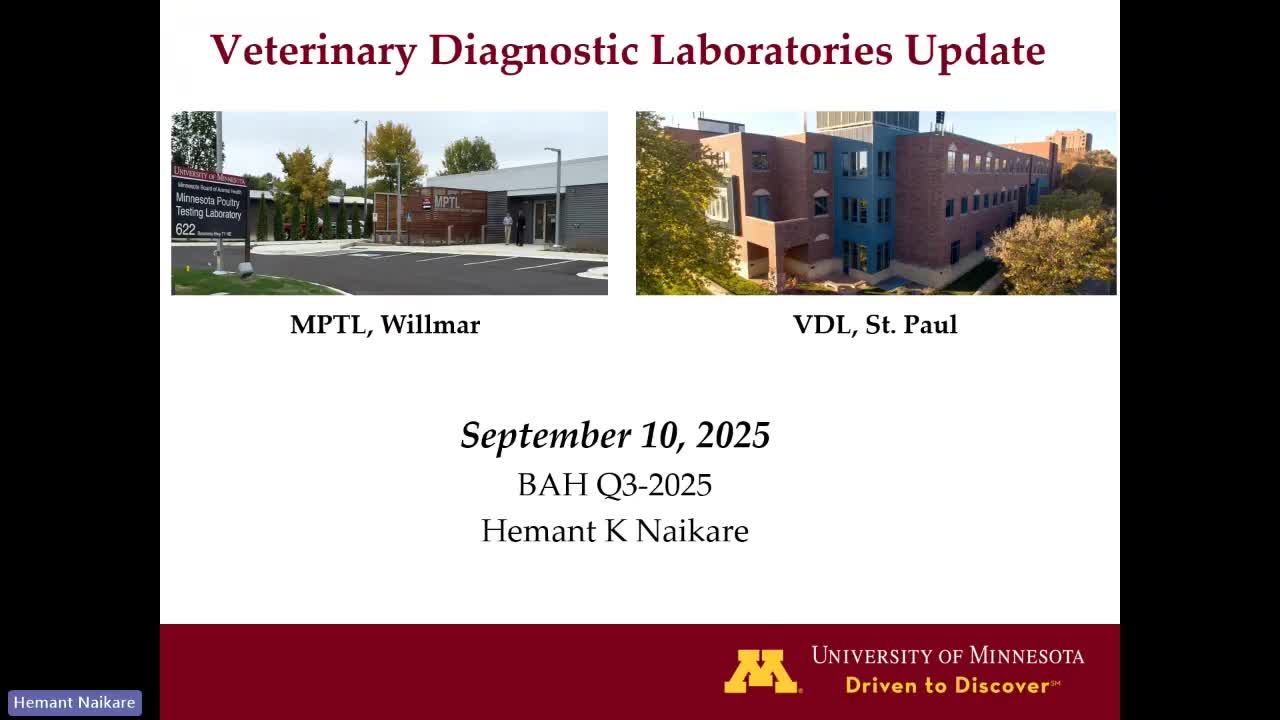Veterinary Diagnostic Lab Reports Staff Updates and New Testing Initiatives in Minnesota
September 11, 2025 | Board of Animal Health, Agencies, Boards, & Commissions, Executive, Minnesota
This article was created by AI summarizing key points discussed. AI makes mistakes, so for full details and context, please refer to the video of the full meeting. Please report any errors so we can fix them. Report an error »

The Minnesota Board of Animal Health convened on September 11, 2025, to discuss significant updates from the Veterinary Diagnostic Lab, which operates two locations in Saint Paul and Wilmar. The meeting highlighted key personnel changes, laboratory achievements, and ongoing challenges, all of which are crucial for the state's animal health landscape.
One of the most notable updates was the retirement of two prominent figures in the lab: Dr. Stephanie Russo, who had been instrumental in developing the molecular diagnostic section for nearly three decades, and Dr. Connie Gebhardt, a respected expert in swine disease. Their departures mark a significant transition for the lab, but the introduction of three new pathologists—Dr. Talita Resendy, Dr. Varvara Semenova, and Dr. Carlos Lopez—aims to bolster the lab's capabilities in food animal and poultry diagnostics.
The lab's commitment to workforce development was underscored by the addition of two new pathology residents, Dr. Jessica Santos and Dr. Joshua Hall, as well as the hosting of fellows from the CDC and a Fulbright scholar from Morocco. These initiatives are designed to enhance training and research, addressing the ongoing challenge of recruiting qualified pathologists.
Financially, the lab faces pressures due to inflation and operational costs, leading to a strategic fee increase implemented in August. Despite these challenges, the lab received a significant boost with a $1 million funding approval from the U.S. Senate, pending final approval from the House. This funding is expected to enhance the lab's diagnostic capabilities and electronic management systems.
The lab reported a 9% increase in testing volume compared to the previous year, conducting approximately 150,000 tests in the first two months of the fiscal year. This uptick reflects the lab's ongoing efforts to meet the needs of its diverse clientele, including new tests for reproductive diseases in ruminants and support for biomedical research companies.
As the flu season approaches, the lab is prepared to handle high-path avian influenza testing, with the capacity to conduct up to 3,000 PCR tests daily if necessary. This readiness is crucial for safeguarding animal health in Minnesota, particularly as the state navigates the complexities of animal disease management.
In conclusion, the quarterly meeting underscored the lab's resilience and adaptability in the face of personnel changes and financial challenges. The ongoing recruitment efforts, coupled with new funding and increased testing capabilities, position the Veterinary Diagnostic Lab to continue serving Minnesota's agricultural community effectively. The board's commitment to stakeholder engagement and innovation remains vital as they work to enhance animal health services across the state.
One of the most notable updates was the retirement of two prominent figures in the lab: Dr. Stephanie Russo, who had been instrumental in developing the molecular diagnostic section for nearly three decades, and Dr. Connie Gebhardt, a respected expert in swine disease. Their departures mark a significant transition for the lab, but the introduction of three new pathologists—Dr. Talita Resendy, Dr. Varvara Semenova, and Dr. Carlos Lopez—aims to bolster the lab's capabilities in food animal and poultry diagnostics.
The lab's commitment to workforce development was underscored by the addition of two new pathology residents, Dr. Jessica Santos and Dr. Joshua Hall, as well as the hosting of fellows from the CDC and a Fulbright scholar from Morocco. These initiatives are designed to enhance training and research, addressing the ongoing challenge of recruiting qualified pathologists.
Financially, the lab faces pressures due to inflation and operational costs, leading to a strategic fee increase implemented in August. Despite these challenges, the lab received a significant boost with a $1 million funding approval from the U.S. Senate, pending final approval from the House. This funding is expected to enhance the lab's diagnostic capabilities and electronic management systems.
The lab reported a 9% increase in testing volume compared to the previous year, conducting approximately 150,000 tests in the first two months of the fiscal year. This uptick reflects the lab's ongoing efforts to meet the needs of its diverse clientele, including new tests for reproductive diseases in ruminants and support for biomedical research companies.
As the flu season approaches, the lab is prepared to handle high-path avian influenza testing, with the capacity to conduct up to 3,000 PCR tests daily if necessary. This readiness is crucial for safeguarding animal health in Minnesota, particularly as the state navigates the complexities of animal disease management.
In conclusion, the quarterly meeting underscored the lab's resilience and adaptability in the face of personnel changes and financial challenges. The ongoing recruitment efforts, coupled with new funding and increased testing capabilities, position the Veterinary Diagnostic Lab to continue serving Minnesota's agricultural community effectively. The board's commitment to stakeholder engagement and innovation remains vital as they work to enhance animal health services across the state.
View full meeting
This article is based on a recent meeting—watch the full video and explore the complete transcript for deeper insights into the discussion.
View full meeting
